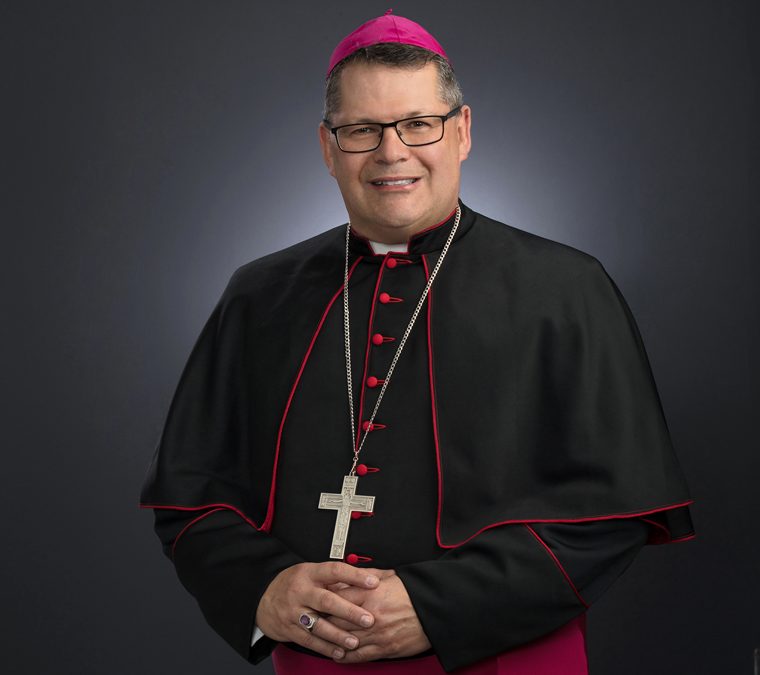Editor’s note: The following is Bishop Douglas J. Lucia’s homily for the Fifth Sunday of Easter.
Mahatma Gandhi is reported to have said, “I love your Christ, but your Christians are not like Christ.” Difficult words to hear, sisters and brothers, but from this comment we might be fairly sure that the Christians he encountered were not living up to the ideal reflected in this Sunday’s Gospel. It leads us to ask ourselves: “What image of Christianity do we present by our actions? By our love or lack thereof? Do we love like Jesus did, to the point of laying down our life … to the point that it all isn’t about me?”
Not easy questions to face, but actually for us as Christ’s church, essential ones! In fact, the shadow of Judas Iscariot falls over the first verse of today’s Gospel. Jesus’ words about glory and love are spoken only after this chosen disciple has gone out into the night that is already within him. Quite literally, Judas has gone over to the dark side!
Sadly, brothers and sisters, this same scene — this loss of faith in Jesus — has been repeated down through the ages! The betrayal of baptismal or ordination promises and of marriage or religious vows; and the, all too often, accompanying sexual, physical or psychological abuse by those known as Catholics and as Christians — especially those in whom great trust has been placed — has weakened our witness to those seeking “God’s dwelling with the human race” (Rv 21:3).
In all truth, when I look at the turmoil that our nation is in and the weakened voice of the Church today — it points to one thing — all these are failures in obedience to Jesus’ command to love one another as he has loved us! That’s what it boils down to!
This Sunday’s Gospel is it: the finale, the final word, the last message that Jesus leaves with us before ascending into heaven. It’s simple and straightforward. There isn’t a lot of room to wonder what he’s talking about. Love one another. That’s it. That’s the endgame. Our job is to love one another. How? “As I have loved you” (Jn 13:34). Think back to the Gospel two Sundays ago when Jesus asked Peter, “Do you love me?” three times. The questioning was accompanied by a call to action, a call to live on in love.
Throughout the Gospels, Jesus has modeled this love for us. He could have ended everything by reminding us that we are loved, and always will be. Instead of choosing words to soothe, Jesus gives us a new commandment. In Jesus’ last moments with his closest friends, he tells them, “Go and do for others what I did for you.”
Still, brothers and sisters, you and I may wonder what does this mean for us here and now? One of the noteworthy words for “resurrection” is anastasis which signifies, “standing up.” Jesus stood up for the insignificant, dispossessed and disadvantaged people; he stood up against the lack of love in powerful people and places, both civil and religious, and he died because this was the way he lived.
In the end, this is why God “stood up” for Jesus by raising him from the dead to the glory of his resurrection. This is why as a community of believers we are called to practice God’s love not just within these four walls or with those who share with us at this table, but even more into the public square. We are called to share God’s love not with just those who may believe like we do, but even more with those who may not!
This past week, the Roman Catholic Bishops of New York State issued what I consider to be a profound and engaging statement on “A Pro-Life Future in the Empire State.” I would like to encourage you to read it. It not only concisely reiterates the Catholic Church’s teaching on the sanctity of life, but even more celebrates the gift of love to be found in the womb. Just this week, I saw the sonogram of my next grandniece or nephew; how could I not be moved to marvel over the gift of human life. Yet, I know that the fears and anxieties of a young woman facing an unplanned pregnancy are very real.
Although I have embraced the gift of celibacy as an ordained Catholic cleric for over thirty-three years, I still was a teenager and a twenty-something. I remember the challenges and uncertainty of those developmental years. That is why in this week’s statements, the bishops of New York State write: “This presents a pastoral challenge for bishops, clergy, Church leaders and, indeed, for all faithful Catholics.” A challenge to minister to and to provide needed services and resources to mother and child, to spouse or partner. In addition, the Catholic Church is also here for anyone in need of healing from an abortion.
The statement concludes by acknowledging the present political realities of New York State government, but the bishops promise to seek common ground to reduce the rate of abortion and a vision for a future full of hope for mother and child. I share all of this with you to illustrate what it means to stand up and be an Easter people … to be a people who witness to the resurrection and the realness of God’s love.
Let me conclude with the following thought and questions: We belong to the glorious reign of God when we love with the self-giving love of Christ. How do you and I embody this love? Where in your life … where in my life … is God asking us to love with more intention?







